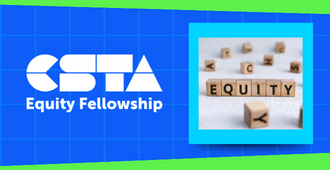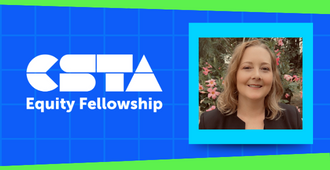Posted by CSTA on May 16, 2023

Long before he became an educator, Jigar was already accustomed to challenging those around him to see from a new perspective. In rural Pennsylvania, where he grew up, few of his peers (or even teachers) had ever interacted with someone from India before, and their perceptions of Indian people were shaped entirely by what they had seen in movies and on TV.
Full Story
Jigar Patel is the coordinator for innovation and special projects at Tuscarora Intermediate Unit 11 (TIU11), a regional education service center in rural central Pennsylvania, where he supports the Spark Lab, a makerspace for K–12 students and educators. A proud first-generation Indian American, Jigar holds a BA from Juniata College and a master’s degree from Birmingham City University. He is an adjunct lecturer at Juniata College, a CMU CS Academy Trainer, and a Raspberry Pi Certified Educator who has been leading professional developments on Raspberry Pi for the past seven years.
In 2021, Jigar was named 2021 Pennsylvania Association for Education and Communications and Technology (PAECT) Outstanding Leader of the Year for his work to remove barriers in distance education and provide equitable learning opportunities to all. He is also a participant in the 2022 Pennsylvania STEM Ambassador Program, an advocacy effort that trains leaders in the field on how to engage with policymakers, industry, and community to advance STEM-related policy goals.

Long before he became an educator, Jigar was already accustomed to challenging those around him to see from a new perspective. In rural Pennsylvania, where he grew up, few of his peers (or even teachers) had ever interacted with someone from India before, and their perceptions of Indian people were shaped entirely by what they had seen in movies and on TV. When he offers professional development to local teachers, Jigar is intentional about inviting guests and speakers from backgrounds that may be unfamiliar to those in the community. “I bring a different experience for them,” he says. At times, that new experience can feel uncomfortable, and Jigar encourages people to use that discomfort to learn and grow.
Jigar is a dedicated advocate for rural students and communities. He says, “I would challenge that [rural] students are extremely marginalized compared to urban areas, [which] have the luxury of resources.” As a student himself, Jigar often lacked access to opportunities and resources that were available to students in urban and suburban areas. He felt particularly disconnected from educational supports for and by people of color. “It was just my family,” he says.
One major problem area is that rural students—a population that includes many girls, nonbinary students, students with disabilities, and students of color—are literally disconnected. In the early days of the COVID-19 pandemic, a rural district in Jigar’s region discovered that nearly a quarter of students did not have reliable home internet or cell phone access. Those students were cut off from Zoom and other forms of online learning. Undaunted, Jigar discovered a way to distribute over 100 Raspberry Pis to students within four weeks of the schools closing for COVID. He worked with teachers to create offline lesson plans using Raspberry Pi and the open-source offline learning platform Kolibri.
This strategy was later adopted as a statewide model, and Jigar took the lead in expanding the program to over 1200 students. Local PBS stations also used this model to roll out Datacasting, a technological system that allows teachers to send lessons and other learning materials via traditional television airways, thereby reaching students without home internet access. Jigar’s work enabled disconnected students to program drones using Python, all without internet or face-to-face learning. “I continue to be a leader in delivering Raspberry Pi–related professional development in the Commonwealth of Pennsylvania,” says Jigar. “To date, I have trained over 650 teachers, mostly in rural parts of Pennsylvania.”
Jigar is excited to use his time as a CSTA Equity Fellow to learn new strategies to provide, in his words, “equitable learning opportunities to those in rural areas who don’t have the same level of access.” He wants to share his firsthand experience with navigating the deep digital divide between rural and urban schools, to help CS advocates understand that their efforts may be leaving out vulnerable students simply because of logistical challenges or because the number of students impacted is lower in rural areas than urban ones. “It is extremely difficult for students who, when they go home, have no internet access,” Jigar reminds us. “They can’t just look up how to do something on YouTube, or Google the answer.”
Jigar hopes to collaborate with the other Equity Fellows to “focus on scaling a solution that supports CS education for those that don’t have any access to the internet.”



